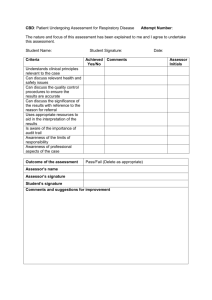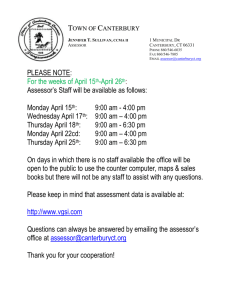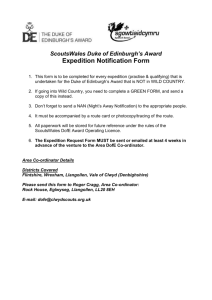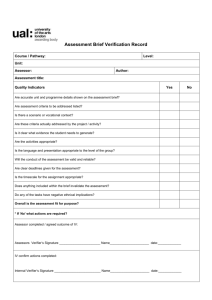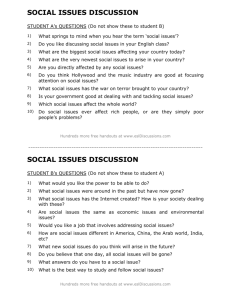EAAS Handouts and Case Studies – Recommended Slides
advertisement
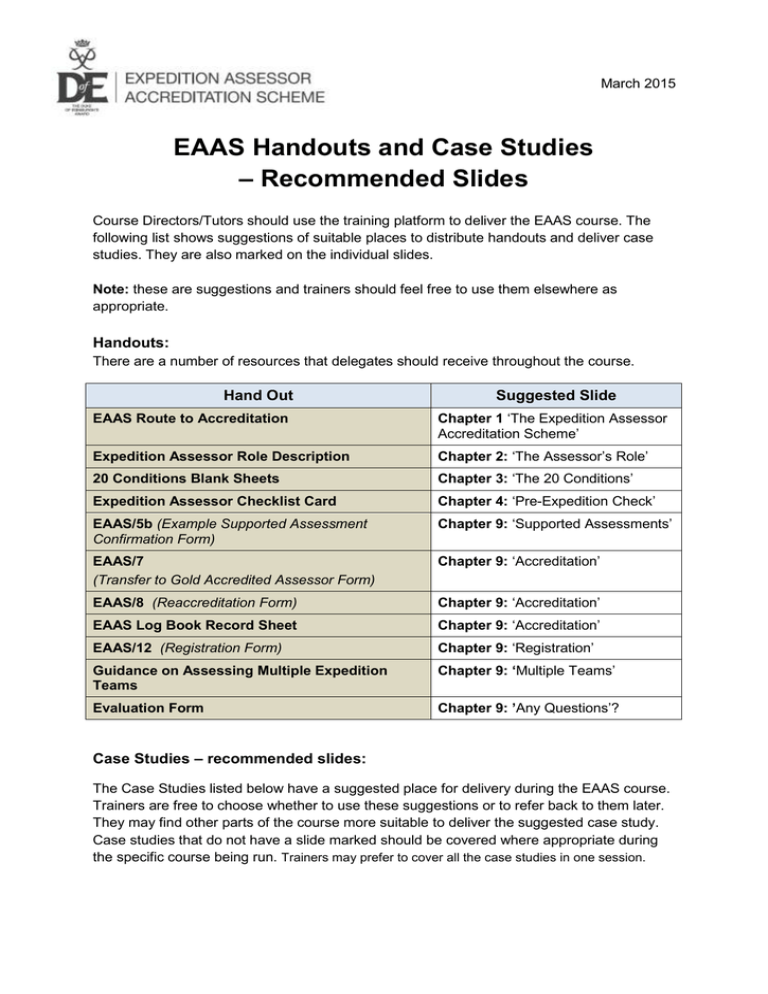
March 2015 EAAS Handouts and Case Studies – Recommended Slides Course Directors/Tutors should use the training platform to deliver the EAAS course. The following list shows suggestions of suitable places to distribute handouts and deliver case studies. They are also marked on the individual slides. Note: these are suggestions and trainers should feel free to use them elsewhere as appropriate. Handouts: There are a number of resources that delegates should receive throughout the course. Hand Out Suggested Slide EAAS Route to Accreditation Chapter 1 ‘The Expedition Assessor Accreditation Scheme’ Expedition Assessor Role Description Chapter 2: ‘The Assessor’s Role’ 20 Conditions Blank Sheets Chapter 3: ‘The 20 Conditions’ Expedition Assessor Checklist Card Chapter 4: ‘Pre-Expedition Check’ EAAS/5b (Example Supported Assessment Confirmation Form) Chapter 9: ‘Supported Assessments’ EAAS/7 (Transfer to Gold Accredited Assessor Form) Chapter 9: ‘Accreditation’ EAAS/8 (Reaccreditation Form) Chapter 9: ‘Accreditation’ EAAS Log Book Record Sheet Chapter 9: ‘Accreditation’ EAAS/12 (Registration Form) Chapter 9: ‘Registration’ Guidance on Assessing Multiple Expedition Teams Chapter 9: ‘Multiple Teams’ Evaluation Form Chapter 9: ’Any Questions’? Case Studies – recommended slides: The Case Studies listed below have a suggested place for delivery during the EAAS course. Trainers are free to choose whether to use these suggestions or to refer back to them later. They may find other parts of the course more suitable to deliver the suggested case study. Case studies that do not have a slide marked should be covered where appropriate during the specific course being run. Trainers may prefer to cover all the case studies in one session. Required Case Studies (must be covered) Case Study 1 Case Study 2 Case Study 3 Case Study 4 Case Study 5 Case Study 6 Case Study 7 Case Study 8 Case Study 9 Case Study 10 Injury -Team Numbers Self-sufficiency - Food Team Numbers Suitable Equipment Hours of Activity –Delayed Start Safeguarding Additional Needs - Journeying Assessor/Supervisor Disagreement Changing Routes Pre-Supplied Route Optional Case Studies Case Study 11 Case Study 12 Case Study 13 Case Study 14 Case Study 15 Case Study 16 Case Study 17 Case Study 18 Case Study 19 Case Study 20 Case Study 21 Case Study 22 Case Study 23 Case Study 24 Case Study 25 Case Study 26 Case Study 27 Case Study 28 Case Study 29 Case Study 30 Case Study 31 Case Study 32 Case Study 33 Case Study 34 Case Study 35 Case Study 36 Multiple Teams Inadequate Fitness Supervisor Camping Use of GPS Health Toilet Use Equipment – Pre-positioning Use of Mobile Phones Route Card Injury – Reduced Distance Time Keeping Self-sufficiency - Camping Hours of Activity - Early Finish Emergency Procedures Alcohol Dieting Use of time Supervision Using Tracking Additional Needs - Medical interventions Family Impartiality Group Impartiality Drop Cards/Water Drops Route - Short Cut Late Notice/Registration Form Litter Quality of Presentation Suggested Slide Chapter 3: ‘Potential Problems’ Chapter 5: ‘Meetings at the Campsite’ Chapter 3: ‘Dealing with Problems’ Chapter 4: ‘Initial Contact’ Chapter 3: ‘Dealing with Problems’ Chapter 3: ‘Dealing with Problems’ Chapter 4: ‘Initial Contact’ Chapter 3: ‘Dealing with Problems’ Chapter 3: ‘Dealing with Problems’ Chapter 3: ‘Dealing with Problems’ Suggested Slide Chapter 9: ‘Multiple Teams’ Chapter 2: ‘The Role of the Assessor’ Chapter 5: ‘Meetings at the Campsite’ Chapter 4: ‘Pre-Expedition Check’ Chapter 3: ‘Potential Problems’ Chapter 3: ‘Potential Problems’ Chapter 5: ‘Meetings at the Campsite’ Chapter 4: ‘Pre-Expedition Check’ Chapter 4: ‘Initial Contact’ Chapter 3: ‘Dealing with Problems’ Chapter 5: ‘Meetings on the Move’ Chapter 5: ‘Meetings at the Campsite’ Chapter 5: ‘Meetings on the Move’ Chapter 4: ‘Topics’ Chapter 5: ‘Meetings at the Campsite’ Chapter 4: ‘Topics’ Chapter 5: ‘Meetings on the Move’ Chapter 3: ‘Potential Problems’ Chapter 4: ‘Initial Contact’ Chapter 9: ‘Who can you assess?’ Chapter 9: ‘Who can you assess?’ Chapter 4: ‘Pre-Expedition Check’ Chapter 3: Dealing with Problems’ Chapter 9: ‘Registration’ Chapter 4: ‘Topics’ Chapter 6: ‘Presentations’
